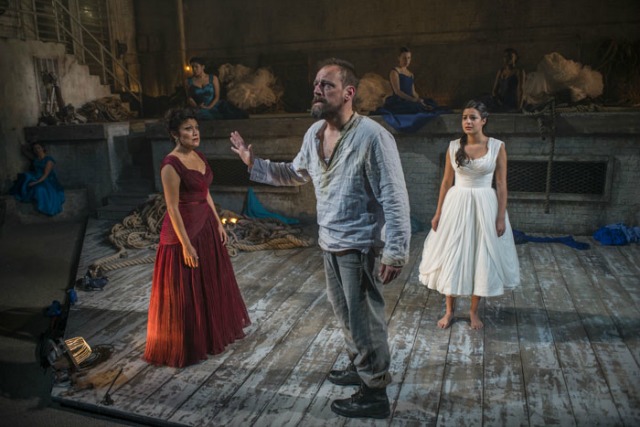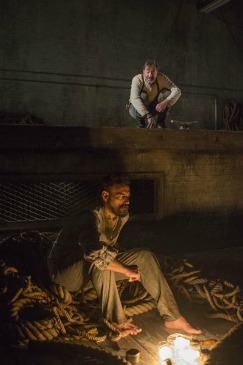The Making Of The Myth At The Court's 'Iphigenia'
By Melody Udell in Arts & Entertainment on Nov 19, 2014 7:00PM

'Iphigenia in Aulis' at the Court Theatre.
These are tough times for the Greeks. The beautiful Helen, their most prized national symbol, has abandoned her country and her husband, Menelaus, (or been kidnapped, depending on which playwright you read) for a new life with the Trojan playboy Paris. This act invokes the wrath of not only a husband but of thousands of would-be suitors to Helen, who promised to help exact revenge on whoever may one day choose to deprive the Greeks of their national sweetheart.
On the verge of what would become the brutal, 10-year Trojan War, at the Bay of Aulis where Greek ships are poised to sail, battle-ready, to Troy, the winds are silent. Desperate to leave port and wage war, King Agamemnon (Mark L. Montgomery)—brother of Menelaus—is informed by a prophet that the gods require a sacrifice. And not just any sacrifice. Agamemnon must kill his young daughter Iphigenia (Stephanie Andrea Barron) to appease the gods and receive favorable winds.
That's just the backstory for the Court Theatre's production of Iphigenia in Aulis, written by the Greek playwright Euripides but performed in a new translation by the Court's founding artistic director, Nicholas Rudall.
The play was written just after the Peloponnesian War, at a time when the Greek playwright Euripides was openly sick of rampant bloodlust and wanted the people of Athens to assess their war-mongering ways—and he used the death of an innocent young woman to illustrate his point. As Iphigenia, herself, asks her father once she learns of her fate, on which the entire war hinges: “What does my life have to do with the marriage of Paris and Helen, Father? Why has their marriage brought about my death?” In this moment, Euripides’ growing resentment toward war and prophecy—both futile acts—are made clear. 
To help propel such unimaginable tragedy, director Charles Newell has assembled a fully capable cast. Sandra Marquez is both formidable and tragic in her portrayal of Agamemnon's wife, Clytemnestra, who struggles, relentlessly, against the seemingly resolute forces that demand her daughter’s death. In Montgomery, we seen an Agamemnon who is truly conflicted between familial love and civic duty, yet he understands that to deny the prophecy and save his daughter’s life will bring about mutiny within Greece itself. The Greeks demand sacrifice. They demand war.
Clytemnestra and Agamemnon pace furiously on Scott Davis’ weathered set, a battered dock dressed with piles of ropes and gnarled wooden planks, reminding the audience that the Greek navy is at the ready. Members of the play's chorus (Kasey Alfonso, Jeanne T. Arrigo, Emjoy Gavino, Tania Richard, Adrienne Walker and Tracy Walsh) loiter on the dock below, openly condemning Iphigenia’s impending sacrifice and cursing the war in the name of Helen. While there isn’t a ballet aria, as Euripides’ original version intended, Newell's chorus helps to deepen the storytelling, moving deliberately and turning to song just as tension truly starts to mount.
Believing that she’s been summoned to Aulis to marry the warrior Achillies (played with near-comic arrogance by Jordan Brown), Iphigenia has the most radical transformation in the play, which is already filled with characters having changes in heart. After accepting her fate, which she and the Greeks believe to be pivotal, Iphigenia’s last words turn into chilling platitudes about her homeland and her role as a martyr, which she knows will ensure a victorious, free Greece. But does sacrifice in the name of war, which will kill thousands of Greeks and Trojans alike, help an ordinary person ascend to hero status? The Court's production recognizes this, and ensures that the play’s ending doesn't sit easily—as surely Euripides intended.
The show runs through Sunday, Dec. 7 at the Court Theatre, 5535 S. Ellis Ave., 773-753-4472 or online.